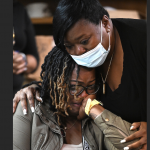By Nicole S. Daniel
The Birmingham Times
This is another installment in The Birmingham Times/AL.com joint series “Beyond the Violence: What can be done to address Birmingham’s rising homicide rate.” Sign up for the newsletter here.
Few can imagine the loss of a child “because it’s not the order of the way life is supposed to go,” said LaTirra Payne, who lost her 16-year-old son, Jamie Gibson, on May 4, 2022.
“[When anyone says], ‘I just couldn’t imagine,’ I tell them, ‘Don’t imagine,’” she said. “Everybody around me has their children, and no one can really empathize, but they can sympathize. … [For] so many mothers who have had to experience burying their child, [it] is heart wrenching.”
Payne has found solace in What About Us, a Birmingham-based nonprofit organization that provides support services for those who have experienced the loss of a child. It was founded by Sheree Kennon, who lost her 27-year-old son, Detraio Deshawn Whorton, 27, to gun violence on Feb. 25, 2021.
“When you experience a loss, such as what I’ve experienced, … you don’t have many people in your close circle that have experienced the same loss—which is a good thing,” Payne said. “So, to come into a group where mothers actually feel your pain without you saying a word is encouraging and uplifting. … It allows me to know that I’m not alone.”
Gun violence has continued to escalate over the past several years in Birmingham, and the city ended 2022 with the families and friends of 144 homicide victims left grieving. The year was deadliest in recent history and only a few homicides short of being the deadliest in the Magic City’s entire history. The highest number of homicides recorded in recent memory was 141 in 1991.
Payne remembers receiving a call last May from her son’s father asking if she had heard from Jamie. “I told him that I hadn’t heard from him, and that’s when said he had gotten a call saying [Jamie] may have been shot. I instantly dropped the phone,” she said.
Moments later she received another phone call telling her that she should go to Grandview Medical Center. “They wouldn’t give me any information over the phone,” Payne said. “I knew then that it was [my son].”
When she arrived, she spoke with a nurse who tried to help her son before he passed. She remembers the nurse trying to console her while asking questions to verify for sure whether it was her son. His identity wasn’t confirmed until officers from the Birmingham Police Department arrived.
“They asked me to show a picture of my son. They had a picture, too, and that’s how we confirmed that it was him,” said Payne, adding that she fell to the floor and vomited.
“I’ll never forget that day. People say it gets easier, but it doesn’t. It’s just the realization that you really won’t see your child again. That’s the end of it.”
After her son was murdered, Payne had many questions.
“[I wondered], what happens after death? What happens to a corpse when it goes underground? And how long does it take?’” she recalled. “My mind just goes so many places because that was my only son. … I have a daughter; she’s 8 [years old]. But [my son] was literally my best friend, and you want to know even after death what is going on with him. Just the fact that I won’t see, touch, and hug him again won’t allow my mind to leave my child.”
Payne also misses her son’s laugh.
“It was infectious,” she said. “It didn’t matter what it was. He would laugh at the craziest things, and I would say, ‘Boy, that ain’t even funny.’ He also grew taller than me. He was 5-foot-9, and I’m only 5-foot-1, and … he would bend down to hug me. … I miss him tremendously.”
As a parent who’s faced this traumatic experience, Payne encourages other parents in similar situations to “hold on to God.”
“So many things and people change after an experience like this, but God don’t. He doesn’t change, so just hold on to him.”
To learn more about What About Us email Sheree Kennon at shereekennon@yahoo.com or what.about.us.moms@gmail.com









